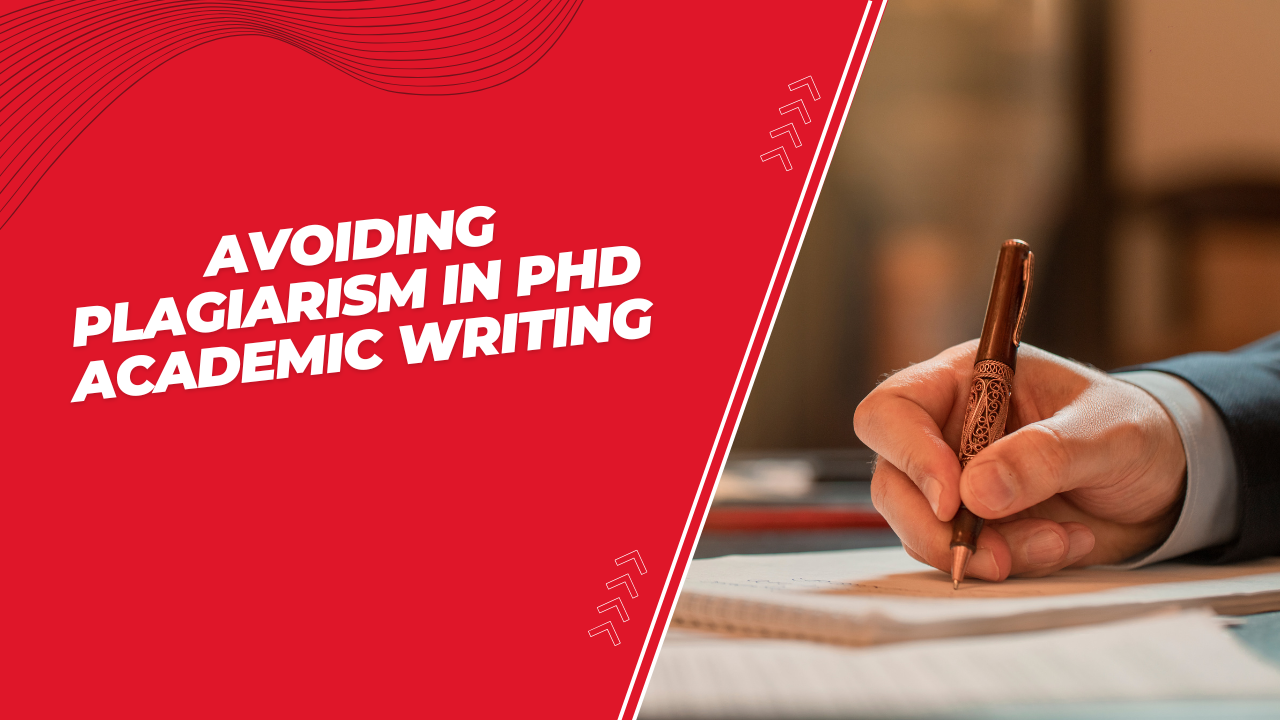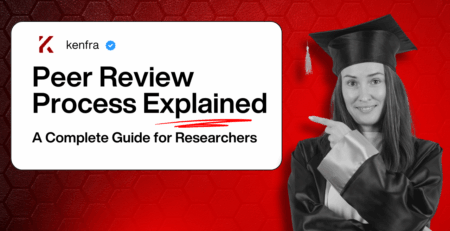Avoiding Plagiarism in PhD Academic Writing
Kenfra Research - Shallo2025-06-12T17:03:34+05:30Pursuing a PhD is one of the most intellectually demanding journeys a scholar can undertake. Among the many responsibilities that come with PhD Academic Writing, maintaining originality and avoiding plagiarism stands out as a core ethical obligation. In the world of PhD Academic Writing, plagiarism can not only damage your credibility but also jeopardize your academic career. This comprehensive guide will walk you through how to avoid plagiarism in PhD Academic Writing, the different types of plagiarism, effective paraphrasing strategies, proper citation practices, and tools that can help you stay on the right track.

What is Plagiarism in PhD Academic Writing?
Plagiarism is the act of presenting someone else’s work, ideas, or words as your own without proper acknowledgment. In the context of PhD academic writing, it includes:
- Copying text directly from published sources without citation
- Paraphrasing without proper attribution
- Using data or images without credit
- Submitting someone else’s work as your own
- Self-plagiarism—reusing your own previous work without disclosure
Plagiarism, intentional or unintentional, is treated as academic misconduct by universities and journals. It can result in thesis rejection, loss of credibility, or even expulsion.
Why Plagiarism is a Critical Issue for PhD Scholars
- Ethical Responsibility
As a PhD scholar, you’re contributing to the body of knowledge in your field. Plagiarism undermines the integrity of that contribution and disrespects original authors.
- Academic Penalties
Most universities have strict anti-plagiarism policies. Even minor similarities can delay your thesis submission or lead to rejection by supervisors and peer reviewers.
- Reputation Damage
Getting caught in plagiarism—even if accidental—can tarnish your academic reputation permanently. Journals may blacklist you, and you may lose future research or teaching opportunities.
Types of Plagiarism in PhD Research Writing
Understanding the different types of plagiarism is the first step in preventing it:
Type of Plagiarism | Description |
Direct Plagiarism | Word-for-word copying of another’s work without attribution. |
Self-Plagiarism | Reusing your own previously published work without citing it. |
Mosaic Plagiarism | Mixing your own words with copied phrases without proper citation. |
Accidental Plagiarism | Failing to cite sources properly due to lack of knowledge or oversight. |
Source-based Plagiarism | Citing sources that are incorrect or fabricated. |
Best Practices to Avoid Plagiarism in PhD Academic Writing
- Start with Original Thinking
Your research should reflect your understanding, analysis, and contribution to a particular topic. While referencing existing work is essential, the focus should be on developing your unique perspective.
- Take Effective Notes
While reviewing literature, always make clear notes distinguishing direct quotes, paraphrased content, and your own ideas. This habit prevents confusion later during writing.
- Master the Art of Paraphrasing
Paraphrasing isn’t just about replacing words with synonyms. You need to understand the original idea fully and express it in your own words while preserving the meaning.
Poor Paraphrasing (Plagiarism):
The researcher believes that social media plays a key role in mental health issues in teenagers.
Good Paraphrasing (Original):
According to the study, platforms like Instagram and TikTok may significantly influence teenagers’ emotional well-being, potentially triggering anxiety and depression.
Always follow paraphrasing with an appropriate citation.
Using Citations Correctly
A critical component of PhD academic writing is knowing when and how to cite. Use citation styles like APA, MLA, IEEE, or Chicago, depending on your discipline.
When to Cite:
- When you quote another author’s exact words
- When you paraphrase someone else’s idea
- When you use statistical data or research findings
- When referencing theories, frameworks, or methodologies
Common Citation Tools:
- Zotero
- Mendeley
- EndNote
- BibTeX (for LaTeX users)
Using citation managers can help you avoid citation errors and stay organized during thesis writing.
How to Use Plagiarism Checkers Effectively
Even with careful writing and citation, unintentional similarities can occur. That’s why running your document through plagiarism detection software is essential.
Popular Plagiarism Checkers:
- Turnitin – Widely used by universities
- Grammarly Premium – Provides advanced writing and similarity reports
- PlagScan – Academic-friendly checker
- iThenticate – Preferred by journal publishers
Make sure your final PhD draft scores well below the allowed similarity index (usually below 10–15%).
Avoiding Self-Plagiarism in Your PhD Thesis
Self-plagiarism happens when you copy and paste from your previous work, such as a conference paper or article, without acknowledgment.
How to Avoid:
- Always cite your previously published papers, even if you’re the sole author.
- Rewrite content in a fresh way if you’re using previous findings in your thesis.
- Disclose reused material to your supervisor or publication editor.
Collaborating Without Plagiarizing
Working with peers and research guides is a healthy part of the PhD process. However, collaborative work must be acknowledged properly.
- Keep records of contributions made by others
- Get written consent if you’re using any part of joint work
- Credit co-authors where applicable
Academic Writing Tips to Stay Plagiarism-Free
- Use your own voice in summaries and conclusions.
- Limit direct quotes—paraphrasing shows deeper understanding.
- Revise and review your drafts thoroughly before submission.
- Seek feedback from supervisors or writing centers.
- Maintain a plagiarism log to track sources and citations used.
The Role of Institutions in Plagiarism Prevention
Many universities now provide:
- Access to licensed plagiarism checkers
- Workshops on academic integrity
- Writing support services
- Anti-plagiarism declarations to be signed before submission
If you’re unsure about plagiarism rules, consult your institution’s academic handbook or ethics guidelines.
Final Thoughts
Plagiarism is one of the most serious academic offenses a PhD scholar can commit—but it’s also completely avoidable. By cultivating ethical PhD Academic Writing habits, using proper citation tools, and developing your own academic voice, you ensure that your research stands on a solid foundation of integrity and originality. Remember: Avoiding plagiarism in PhD Academic Writing is not just about following rules—it’s about upholding the core values of PhD Academic Writing and scholarship.
Kenfra Research understands the challenges faced by PhD scholars and offers tailored solutions to support your academic goals. From topic selection to advanced plagiarism checking.









Leave a Reply